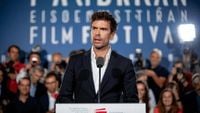At the San Sebastián Film Festival in Spain on September 21, 2025, Angelina Jolie’s words echoed far beyond the ornate halls and red carpets. “I love my country, but at this time, I don’t recognize my country,” she declared, according to The Guardian, her voice cutting through the usual glamour of a festival press conference. It was a moment that swiftly ignited a national debate about free speech, censorship, and the evolving role of celebrity activism in America’s cultural landscape.
Jolie’s remarks came at a particularly fraught time for free expression in the United States. Only days prior, on September 17, ABC indefinitely suspended Jimmy Kimmel Live! after host Jimmy Kimmel made controversial comments regarding the assassination of conservative activist Charlie Kirk. The network’s decision unleashed a storm of backlash from across the entertainment industry and beyond. Stars like Mark Ruffalo, Pedro Pascal, Olivia Rodrigo, and Tatiana Maslany publicly criticized the suspension—Ruffalo accused the government of suppressing free speech, while Pascal urged audiences to “defend democracy.” According to WION, the controversy thrust the issue of First Amendment rights into the spotlight, with unions and free speech advocates warning of a chilling effect on personal expression.
Although Jolie did not mention the Kimmel incident directly, her comments were widely interpreted as a pointed response to the climate of growing restrictions on speech. “My worldview is equal, united and international. Anything anywhere that divides or limits personal expressions and freedoms from anyone, I think, is very dangerous,” she said, as reported by CNN. She went further, warning: “These are such serious times that we have to be careful not to say things casually. These are very, very heavy times we are living in together.”
The press conference, intended to promote Jolie’s new film Couture, quickly became a political flashpoint. Journalists in attendance reportedly responded with nervous laughter, and within hours, clips of her remarks flooded social media feeds. According to People and Variety, the moment forced studios and publicists to recalibrate their messaging and prepare for the potential ramifications during the upcoming awards season. Some wondered aloud: should a celebrity platform be treated as activism, or is it simply part of the entertainment drama?
Jolie’s international profile—as an Oscar-winning actress, filmmaker, and former UNHCR Special Envoy—lent particular weight to her words. Her history of humanitarian work and advocacy for refugees, women’s rights, and children’s education has long set her apart from many of her Hollywood contemporaries. As red94.net’s Jessica Morrison observed, “That combination of cinematic prestige and political clout is why this line has legs beyond the headlines.”
Her comments also reflected a personal crossroads. Jolie, now 50, has made no secret of her growing disillusionment with life in the United States. She told The Hollywood Reporter in 2024 that she only remains in Los Angeles due to ongoing divorce proceedings, but once her youngest children—Knox and Vivienne—turn 18 in 2026, she plans to relocate abroad. According to Economic Times, Jolie is preparing to sell her historic Cecil B. DeMille mansion, seeking a place that offers “privacy, peace, and safety” for her family. “As soon as they’re 18, I’ll be able to leave,” she said, underscoring her desire for a more tranquil life outside the U.S.
The timing of Jolie’s remarks could hardly have been more significant. The indefinite suspension of Jimmy Kimmel Live! had already sent shockwaves through the entertainment world, raising fears of increased corporate caution and self-censorship. Studios, facing growing pressure from both sides of the political spectrum, now found themselves caught between the need to protect their platforms and the risk of alienating audiences—or worse, triggering advertiser boycotts and industry boycotts.
Jolie’s own relationship with Disney, which owns ABC, added further intrigue. She has starred in major Disney projects, including Maleficent and Marvel’s Eternals. Yet at San Sebastián, she seemed to distance her comments from any single incident, instead highlighting broader cultural concerns. “I’ve always lived internationally, my family is international, my friends, my life,” she explained, as reported by FOX. Her internationalist perspective, she suggested, made her especially sensitive to any narrowing of freedoms, wherever they might occur.
For many in the industry, Jolie’s statement—“I don’t recognize my country”—served as both a rallying cry and a warning. It reframed a film premiere as a referendum on American values, forcing studios, awards voters, and audiences alike to confront uncomfortable questions about the boundaries of acceptable speech. As Variety noted, the comment “prompted immediate festival and social debate,” with reactions split between colleagues praising her candor and critics urging greater caution.
Some observers drew parallels to previous moments when Hollywood stars used their platforms to challenge the status quo, but the current climate feels especially charged. The rapid amplification of Jolie’s remarks—across news outlets, social media, and industry circles—underscored the heightened sensitivity surrounding censorship and free speech in 2025. Studios are now rethinking their public relations playbooks, bracing for sharper interviews and more pointed questions throughout the awards season.
Meanwhile, the broader public is left to grapple with the implications. Should celebrities leverage their fame to advocate for political change? Or does this risk politicizing entertainment in ways that could further divide audiences? The debate is far from settled, but one thing is clear: Jolie’s words have struck a nerve, and the reverberations are likely to be felt for months to come.
As for Jolie herself, her commitment to personal expression remains unwavering. “Anything anywhere that divides or limits personal expressions and freedoms from anyone, I think, is very dangerous,” she reiterated at San Sebastián. With her international profile and deep roots in humanitarian work, her voice is likely to remain a powerful force in shaping the conversation around free speech and artistic freedom—both in America and abroad.
One thing’s for certain: in a year already marked by controversy and cultural upheaval, Angelina Jolie’s declaration stands out as a defining moment—one that will continue to challenge, provoke, and inspire debate across the entertainment industry and beyond.






